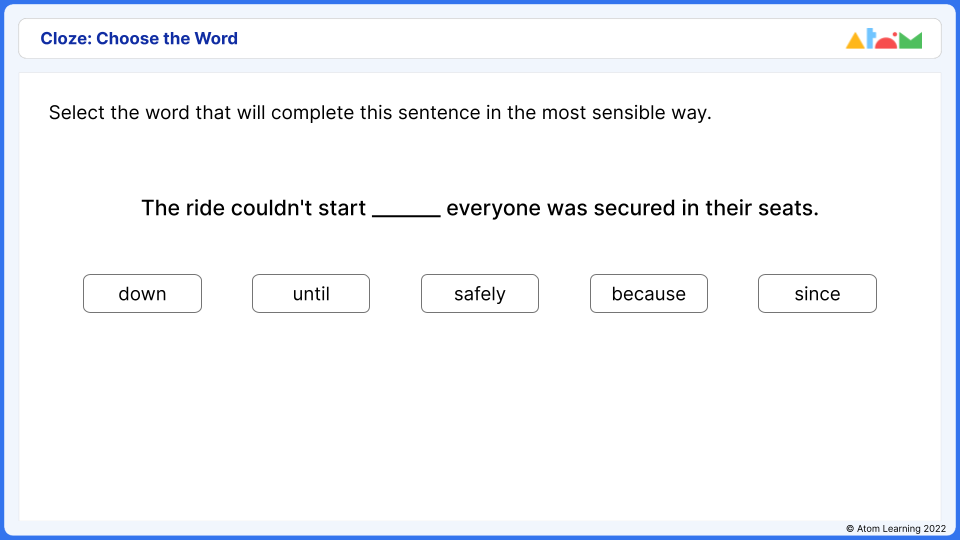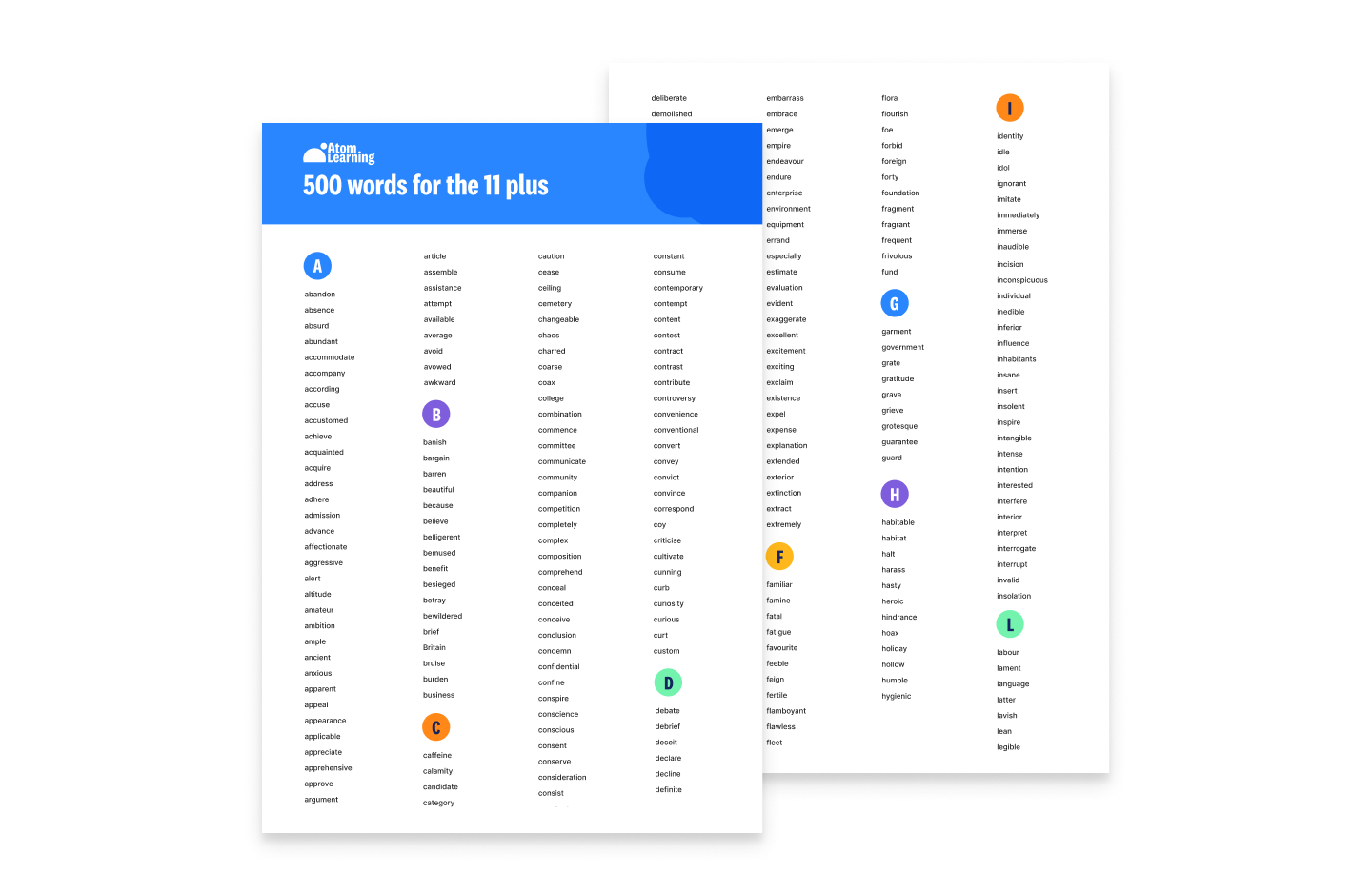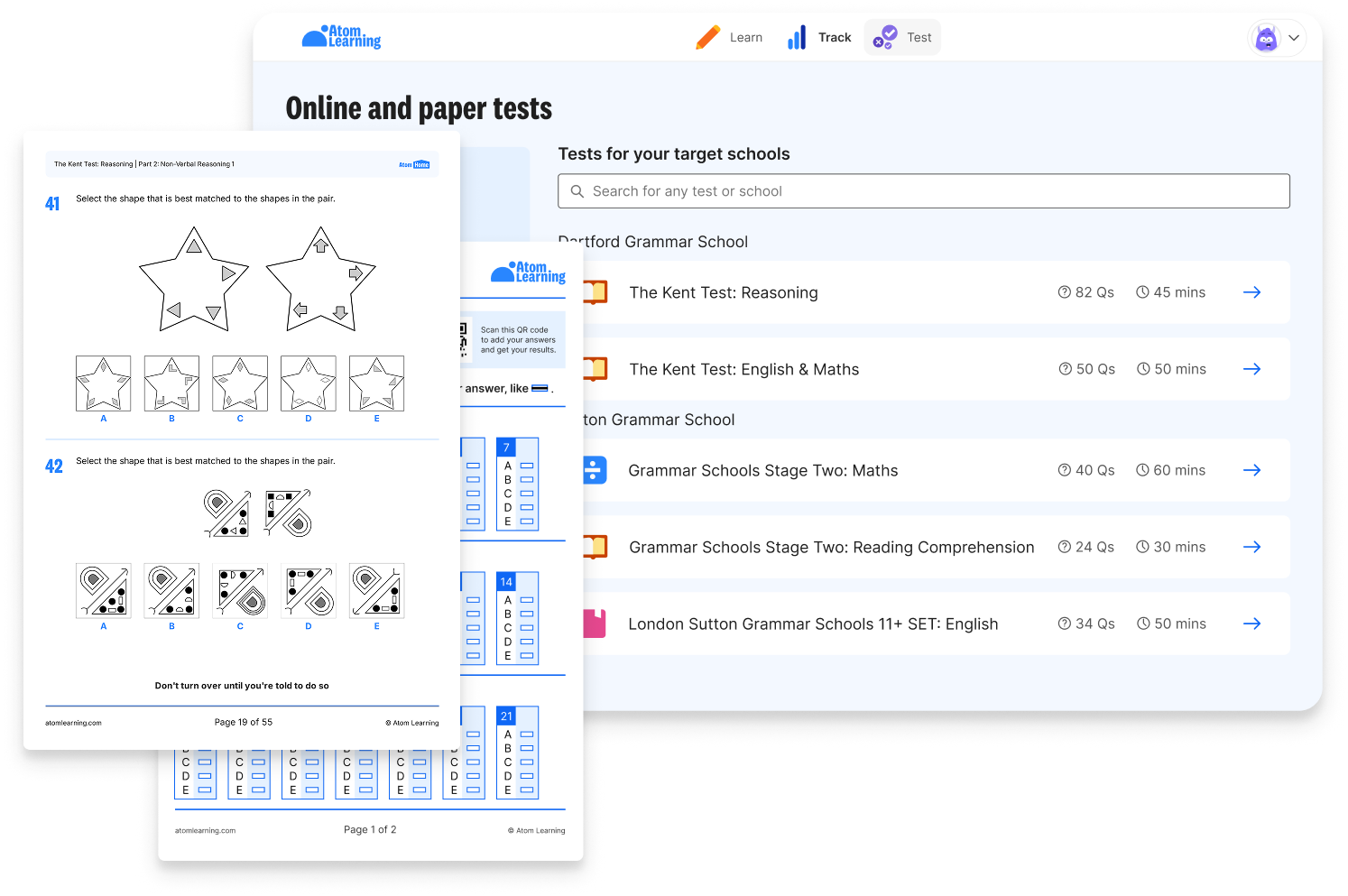Cloze tests in the 11 plus

If your child is applying to a grammar school or a selective independent school, they may need to take a cloze test as part of their entry assessment. Cloze tests are a common part of 11 plus exams and despite the unfamiliar name, they don’t have to be tricky.
Find out all you need to know about cloze test questions here, including examples, top tips, and a free question pack for your child to practise!
What is a cloze test (with examples)?
Cloze questions ask students to choose the correct word or letters to complete a sentence or passage so that it makes grammatical sense.
There are two main types of cloze exercise:
- Choose the word
- Complete the sentence
Choose the word questions
In ‘choose the word’ questions, your child will need to identify the word or words that will best complete a sentence. They will usually need to choose the correct answer from a word bank of five options (multiple-choice style).
Example choose the word question:

Select the word that will complete this sentence in the most sensible way.
‘The ride couldn’t start _____ everyone was secured in their seats.’
down / until / safely / because / since
Complete the sentence questions
In ‘complete the sentence’ style cloze questions, your child will need to find the letters that are missing from a word within a sentence. Depending on the format of the exam, they will either have to write the missing letters, or choose them from a list of options.
Example complete the sentence question:

One word in this sentence is missing three letters; these letters form a correctly spelt word on their own.
Write the three letters that are missing from the incomplete word below.
‘It was a t___quil scene and the lake looked just like a mirror.’
Download your free 11+ vocabulary list
Give your child a head start on their 11+ exam. Get 300 must-know words from past papers, complete with definitions, examples and study tips.

What is a cloze test used for?
Cloze tests are used to assess your child’s vocabulary, reading comprehension skills, spelling and grammar knowledge. The questions depend on understanding the meaning of words and putting them into context. A wide vocabulary and sound understanding of grammar will help your child to approach these questions with confidence.
Why is it called a cloze test?
The name ‘cloze’ comes from the word ‘closure’, which is an idea in Gestalt psychology. This psychological school was popular in the early and mid-20th century. Cloze exercises were first described in 1953 by W. L. Taylor.
Gestalt psychologists believed that people see complete patterns instead of individual parts. The ‘law of closure’ states that people see incomplete objects such as shapes, pictures, letters, words or sentences as complete, as our perception fills in any gaps.
How to solve cloze exercises
Solve ‘choose the word’ questions
Following these steps will help children to identify the word they need to complete the passage.
- Read the sentence through: what’s going on in the sentence? Even if a word is missing, you’ll be able to get a good sense of what the sentence is about.
- Identify the word class of the missing word. Is it a verb, adjective, noun or adverb? You can rule out word options that are not part of this word class.
- Look at the answer choices and choose the word that best fits in the sentence.
- Add the word to the sentence. Read the whole sentence through to double-check that the sentence makes sense.
Solve ‘complete the sentence’ questions
The steps for solving ‘complete the sentence’ style questions are similar to those for solving ‘choose the word’ questions, but the method differs slightly.
- Read the sentence and think about what is happening in it. Look at the other words in the sentence. Do they give you any clues about what the incomplete word is?
- Confirm how many letters are missing from the word.
- Identify and add the missing letters to the incomplete word. Try sounding out the incomplete word. Does it sound like a word you already know?
- Check: Have you made a correctly spelled word? Does the whole sentence make sense?
Which exams use cloze tests?
Cloze questions appear on verbal reasoning and some English papers for grammar school entrance exams.
Cloze tests are also used as part of some independent school entrance assessments. They appear on the ISEB Common Pre-Test English paper, within the grammar section.
As well as summative exams, some schools use cloze tests in the classroom as a formative assessment of children’s English language progress.
Can you revise for cloze tests?
Most children will benefit from steady practice during the year leading up to the 11 plus to become familiar and confident with the format of cloze questions. Cramming in preparation just before the exam can put students under too much pressure.
When we encounter a new question style for the first time, we have to expend a certain amount of cognitive energy to understand what is being asked for. It’s best not to leave this discovery process until the actual exams, and instead give your child the chance to practise and build confidence well in advance.
Aside from practising cloze exercises themselves, another important way to prepare is by reading widely for fun. Fiction and non-fiction books from a range of genres and time periods are an excellent resource to build your child’s vocabulary knowledge and grammatical understanding.
Practice guided reading, where you ask your child questions about what they have read – this will help them to hone their reading comprehension technique too. All of these are key skills which they will need to draw upon to answer cloze questions successfully.
Take control of your child’s 11+ preparation.

Not sure if your child is on track for the grammar school 11+? You don’t need to guess what to cover or whether they’re ready. Atom shows you exactly what to practise each week and how they’re performing, so you can stay ahead of the process without the stress.
- Follow personalised weekly exam plans that show them what to learn next.
- Download replica 11+ practice papers and upload a photo for instant, stress-free marking.
- Track progress and see how they compare to others applying to the same schools.
Start your free trial and help your child feel fully prepared for the 11+.
